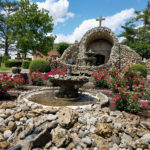(Editor’s note: The Catholic bishops of Iowa have released a statement in support of an Education Savings Accounts proposal at the Iowa legislature. This week is Catholic Schools Week with the theme, “Catholic Schools: Communities of Faith, Knowledge and Service.” There are more than 100 Catholic schools in the state enrolling more than 28,000 students.)
Parents are the ones primarily responsible for the education of their children. We believe Education Savings Accounts (ESAs) are a tool that would empower parents across our state to choose the best and most suitable education for their children, regardless of economic standing. ESAs would allow parents who choose not to enroll their children in a public school to receive a deposit of public funds into a savings account set up by the state. This money could be used by parents for K-12 tuition and fees.
The Iowa Catholic Conference, with the support of thousands of Iowans, asks the legislature to enact an ESA program during the 2015 legislative session. This innovative idea would further level the playing field for parents who lack the resources to choose freely their children’s education setting or who are struggling to keep their children in the school of their choice.
Iowans agree that access to a quality education is important. But there are some who ask: why should taxpayers pay for education outside of a public school?
In fact, state law already makes many provisions for parental choice. Current examples include state-funded preschool, the School Tuition Organization program, the Tuition Tax Credit and “open enrollment” for some public school parents. We also have direct ways of funding private education, such as the Iowa Tuition Grant Program for students attending private colleges. Moreover, private school students receive the benefit of public support for textbooks, transportation and meal programs. These efforts support parents and students and help level the playing field. ESAs are another effort of the same kind.
Nonpublic schools are a long-standing stabilizing force in communities and make a distinctive contribution to the common good. We believe nonpublic schools are among the best anti-poverty programs, offering a first-rate education, enduring moral truth, and discipline that speak to the development of the whole person. Research has shown that robust parental choice in education results in improved academic outcomes both for public schools in general and for student-participants. (A Win-Win Solution: The Empirical Evidence on School Choice, Friedman Foundation for Educational Choice, 2013)
ESAs are also a relatively inexpensive and efficient means to support parents and children. We estimate that for no more than an additional four percent of the current government spending on K-12 education, the state could offer comprehensive choice in education for all nonpublic school students. This would empower parents (no less than schools) to make decisions about their children’s education more freely with more certainty as they plan for the future.
From mutual solidarity and our shared commitment to the common good, all Iowans should be committed to providing real choice in education, not only for those with the means to choose, but for all. For example, an Iowa family wrote the following:
“We have chosen Catholic education for our kids and are extremely happy. Our kids are thriving in the system not only through their faith life, but with the rigorous academic curriculum that our school provides. We will soon have three kids in high school which adds much financial stress to our family. We do everything we can to decrease the tuition. We have sacrificed so much so our kids can be part of such an amazing system. Our kids have worked many hours through the work-study program to decrease some of the tuition costs and we are active in fundraising through our parish. But that is just not enough. That is why we are such strong supporters of the ESA. The ESA would make such a difference and alleviate so much financial burden for our family.”
Nearly 20 years ago, we warned that parents of school age children were finding it more and more difficult to pay school tuition and still make ends meet. Even more so, this is the case today. The state should respect and support the right of parents to choose the most appropriate education for their children and, as far as possible, make such choosing fair and unimpeded. Education Savings Accounts will help give parents the freedom to make a real choice in education.
Archbishop Michael Jackels of Dubuque, Bishop Martin Amos of Davenport, Bishop R. Walker Nickless of Sioux City, and Bishop Richard Pates of Des Moines.

The Catholic Newspaper of the Diocese of Davenport









